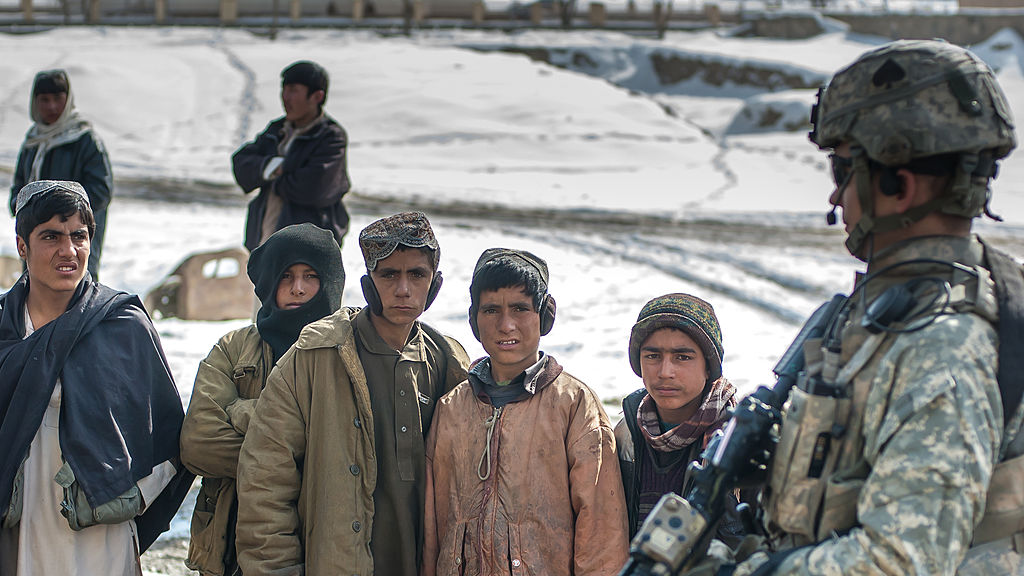
U.S. President Joe Biden speaks from the Treaty Room in the White House about the withdrawal of U.S. troops from Afghanistan in Washington, D.C., April 14, 2021. /Getty
U.S. President Joe Biden speaks from the Treaty Room in the White House about the withdrawal of U.S. troops from Afghanistan in Washington, D.C., April 14, 2021. /Getty
Editor's note: Stephen Ndegwa is a Nairobi-based communication expert, scholar and lecturer at the United States International University-Africa, author and international affairs columnist. The article reflects the author's opinions, and not necessarily the views of CGTN.
The U.S. has made what looks like a final decision that it will now unequivocally withdraw its troops from Afghanistan by September 11, 2021. It is not by coincidence that the date marks exactly 20 years since the coordinated terrorist attacks on American soil by the Al-Qaeda terrorist group in 2001.
In obvious wrathful vengeance, the U.S. invaded Afghanistan in 2001 ostensibly to rout the Al-Qaeda terrorist outfit run by the accused late Osama Bin Laden, who had shifted the operations of his broad-based militant Islamist organization to the country under the patronage of the Taliban militia.
Although the dynamics at play are apparently fluid, politics has played a big role in the reigning confusion caused by shifting timelines for the withdrawal. For instance, on December 1, 2009, then President Barack Obama ordered an additional 30,000 U.S. troops into Afghanistan, while at the same time ironically pledged to begin the withdrawal of troops in 18 months. Then Vice President Biden also said on Twitter on October 12, 2012 that the U.S. will leave Afghanistan in 2014.
Despite repeated promises during his one term in office, former President Donald Trump with his America First policy did not manage a complete draw-down of foreign troops still in war zones in some parts of the world. Trump left office on January 20, with his November 2020 promise of further troop withdrawal from Afghanistan and Iraq still in abeyance.
Sadly, the U.S. has paid a steep price for the intervention in Afghanistan. An article published in the New York Times by Sarah Almukhtar and Rod Nordland on December 9, 2019 titled, "What Did the U.S. Get for $2 Trillion in Afghanistan?" stated "there is little to show for it."
According to the article, by 2019 more than 2,400 American soldiers and over 38,000 Afghan civilians had died in the war. The Taliban still control much of the country and the country remains one of the world's major sources of refugees and migrants. So, what was the invasion about if the socioeconomic and political crisis in Afghanistan has actually worsened in the last two decades?

Local boys follow U.S. soldiers from the 506th Infantry patrolling through the streets of the capital of Wardak Province, Afghanistan. /Getty
Local boys follow U.S. soldiers from the 506th Infantry patrolling through the streets of the capital of Wardak Province, Afghanistan. /Getty
Certainly, the withdrawal was long overdue. What we cannot tell, however, is precisely what took the superpower an inordinately long time to implement the decision. The disgraceful exit of America in the country is reminiscent of the high cost of its involvement in the 19-year misadventure in the Cold War-era – Vietnam War. By the time the U.S. pulled out its troops from Vietnam in 1973 after a resounding defeat, 58,318 Americans had lost their lives compared with the loss of 3.4 million lives including mostly Vietnamese civilians.
There are a couple of pertinent issues we need to interrogate in order to judge the effectiveness of the U.S. occupation of Afghanistan. First is whether the heavy U.S. presence achieved its aim of stemming terrorist attacks emanating from the country, both at home and abroad. Second is the real reason behind sustaining its most expensive war both in casualties and financial expenditure. Third is the overall future of Afghanistan after U.S. withdrawal.
Although loath to admit it, the Biden administration must be feeling like a yoke has been yanked from its neck. There was no moral justification for the superpower to occupy Afghanistan in the pretext of destroying what it said was a citadel of terrorism. Observers say it was another red herring similar to the alleged search for weapons of mass destruction (WMD) that led to the invasion of Iraq in 2003 by U.S. and its allies.
It was a selfish move that ignored the feelings of the Afghans, even as it was clothed in alleged noble intentions. The U.S. intervention may have curtailed major terrorism attacks in the U.S., but it did not stop the escalation of terrorism in other parts of the world.
Amid the withdrawal which starts May 1, uncertainty still exists, which is the reason behind U.S. Secretary of State Antony Blinken's impromptu visit to Afghanistan on April 15. Nevertheless, his reassurance to the Afghan government of U.S. commitment to the country's security sounded hollow, knowing too well that he did not put money on the table for the massive reconstruction needed from America's longest war.
Blinken's promises were non-committal, falling short of saying it as it is – Afghans are on their own from now on. The true situation of what is happening beyond the photo ops is reflected by MP Naheed Farid's remarks during Blinken's visit, who told reporters, "my views are very pessimistic," in relation to what the future portends.
The withdrawal should act as precedence for the long overdue withdrawal of U.S. troops from other security hotspots where it has implanted its military. This includes Iraq, Syria and Cuba's Guantanamo Bay detention camp since 2002.
Ultimately, it should be reiterated that the age of blatant interference in the internal affairs of other countries belongs to a bygone era. This should only happen in cases sanctioned by the international community through the United Nations, and not unilaterally like America and some of its powerful allies have been wont to do.
(If you want to contribute and have specific expertise, please contact us at opinions@cgtn.com)

